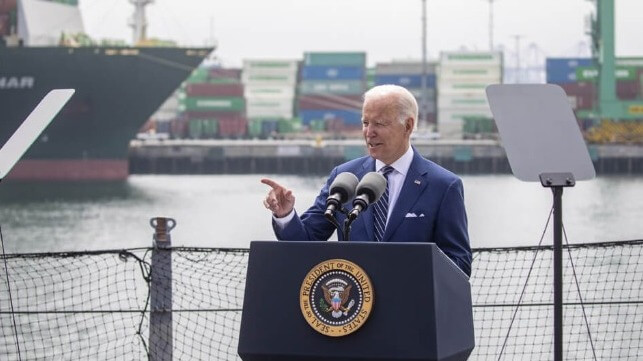Ocean Shipping Reform Act to Become Law Addressing Fees and Exports

The legislation meant to reform oversight of the ocean shipping industry passed the U.S. House of Representatives in a broadly bi-partisan effort late Monday afternoon clearing the way for President Biden to sign it into law. It overhauls the Shipping Act of 1984 enhancing the authority of the Federal Maritime Commission while tackling the complaints of American retailers, importers, exporters, manufacturers, and the agricultural industry about excessive fees and unfair business practices.
The legislative effort began approximately a year ago driven by the frequent and vocal complaints of shippers about the excessive fees charged by the carriers and terminals and barriers to export during the pandemic. California representative John Garamendi is getting credit for starting the process and building the coalition that led to broad support in the U.S. House of Representatives contributing to the House version of the bill passing on a strong bi-partisan vote last December. Senators Amy Klobuchar and John Thune led the effort in the U.S. Senate, which passed its version in March. Today, the U.S. House voted to approve the Senate version and send it to the President for his signature.
While the efforts grew from the complaints about demurrage and detention fees, supporters widened the focus saying it will be a prescriptive measure to address broader issues including inflation and runaway shipping costs. Last week, President Biden unleashed a new round of criticism on the carriers citing as much as a 1,000 percent increase in shipping costs during the pandemic. In a statement this evening applauding the passage of the bill, Biden also focused on the efforts to improve exports saying carriers would no longer be able to refuse American goods leaving with empty containers instead.
The House just passed the Ocean Shipping Reform Act and sent it to @POTUS' desk to be signed into law. Relief for inflation and the supply chain is on its way! Thank you @SenAmyKlobuchar, @SenJohnThune, & @RepDustyJohnson for partnering with me to get this done! pic.twitter.com/Osy0Ap0Cwg
— John Garamendi (@RepGaramendi) June 13, 2022
“I applaud the Congress for passing the Ocean Shipping Reform Act on a bipartisan basis, which will help lower costs for American retailers, farmers and consumers,” said President Biden adding he looks forward to signing it into law.
The bill includes key provisions and authority for the FMC to address D&D charges. Carriers will have the burden of proving the fairness of the charges. The FMC also gains new authority to launch probes into any of the carriers’ business practices, new enforcement authority, and oversight. Carriers have new reporting requirements on the number of import and export containers transported and are barred from unreasonably declining exports. The FMC also gain new authority over the shipping exchanges and alliances that had been the target of President Biden and other critics who contend the business has become too concentrated.
Saying the bill provides needed and overdue updates to the laws and will bring more accountability to how ocean cargo services are provided, FMC Chairman Daniel Maffei issued a statement applauding the passage of the bill.
“The strong bipartisan and bicameral support in Congress to act and address the multitude of challenges U.S. shippers—especially exporters—have faced over the past two years is impressive,” said Maffei. “OSRA will provide the FMC with enhanced authority to ensure industry players have the right incentives and that all stakeholders in the ocean freight transportation system can have a voice.”
The bill also received broad support from retailing, manufacturing, export, and other trade groups. While the bill does not directly address contract and spot Freight rates which have soared, it tackles the fees and supporters say improving business practices and exports will contribute to lower costs and repair issues in the supply chain.
“Decisive policy action is critical to combatting supply chain challenges as the consumer packaged goods industry continues to grapple with unprecedented production and shipping costs,” said Tom Madrecki, Vice President of Supply Chain and Logistics at the Consumer Brands Association, one of the many groups that championed this bill. “The pandemic and subsequent disruptions highlighted the fragility of the complex supply chain system and the need to modernize decades-old ocean regulations to address declining maritime shipping performance and unfair practices that hurt American manufacturers, farmers, and, ultimately, consumers. Consumer Brands commends the final passage of the Ocean Shipping Reform Act, which updates existing law to tackle rising shipping fees and provides the Federal Maritime Commission with additional authorities to protect U.S. exporters and importers.”

that matters most
Get the latest maritime news delivered to your inbox daily.
Representing the carriers, the World Shipping Council had been highly critical of the efforts but said it looked forward to working with the stakeholders to address concerns. They called the House’s version of the bill flawed saying the effort was not doing “anything to fix the landside logistics breakdowns that are at the heart of America’s supply chain problems.” The Senate version, which is now set to become law, the WSC said was “a more deliberative approach” but still fell short of addressing the root causes of the U.S. landside congestion.
Recognizing that the FMC will have an expanded role in the future of the shipping industry, Congress also voted for a nearly 50 percent increase in the budget for the commission over the next four years. Maffei, who was recently renominated to his position as head of the FMC, said in his statement that the commission will move promptly to implement the steps necessary to bring shippers the benefits of the legislation, beginning with the rulemaking addressing export shipments.
